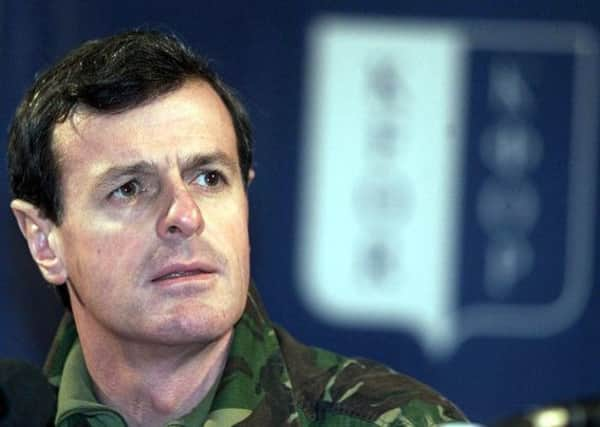In full: General Sir Richard Shirreff’s letter


And in common with many of Scottish descent, I followed my father and his forebears in serving the Crown. After 37 years in the British Army I have just stepped down as NATO’s Deputy Supreme Allied Commander Europe (DSACEUR) at the NATO Headquarters.
As a former DSACEUR and NATO insider I am acutely aware that any country applying to join the Alliance will require unanimous agreement from all 28 current members of NATO. Just one vote against and it will not happen. Added to which, it is highly unlikely that NATO will agree to any further expansion while the promise of NATO membership made to Ukraine and Georgia in 2008 is still on the table. Given the current crisis in Ukraine, there will be no quick fixes and there can be no certainty about Scottish membership of NATO.
Advertisement
Hide AdAdvertisement
Hide AdAs for the nuclear issue, NATO is a nuclear-armed alliance and all NATO states must accept the principle of nuclear deterrence and being part of the NATO nuclear command and control system. Whilst the SNP may accept the principle of nuclear deterrence, it remains unclear how other members of NATO will view the disruption to the coherence of NATO defence caused by moving the submarine fleet out of Scottish waters.
More widely, defence is an insurance policy and while no one likes to pay insurance premiums, it makes more sense to pay a low premium for a comprehensive policy than a high premium for a limited cover policy with a high risk of not paying up when called upon. This is the choice facing Scotland; pay the lowest reasonable premium and enjoy the benefits derived from protection by the British Armed Forces, or pay a higher premium for a dodgy policy in the hope that enough British service personnel voluntarily leave the British Armed Forces to form the proposed Scottish Defence Force.
As an experienced professional soldier, nothing I have seen or heard persuades me that Scotland’s safety or security would be enhanced one iota if it became a separate country. On the contrary, having reviewed the Scottish Government’s White Paper, I find the proposals amateurish, unrealistic and lacking any clear strategic purpose. There is no mention of any naval aviation (yet Scotland would need a primarily naval force), no mention of air-to-air refuelling capability, no Mountain Rescue and no Search & Rescue capability. The White Paper proposals are dangerous and would leave Scotland, the UK and NATO weakened and less capable of dealing with the threats of today and tomorrow. Scotland deserves better.
Let’s look at some detail. As an example of the incoherence of SNP thinking, there are currently six infantry/Guards/Royal Marine units that are Scottish (or Scottish based) plus a further company of Argyll & Sutherland Highlanders. Yet the White Paper commits to only three such units. More bizarre, the SNP commits to reinstating all the Scottish infantry battalions lost in 2006. It simply doesn’t add up. And even if it did, where does this leave the young men who are serving with such distinction in the Royal Regiment of Scotland and made it the regiment which Scotland and all Scots can take such pride in?
Another example of SNP proposals ignoring the detail is the need to comply with regulations on the export and import of defence related articles ‘International Trade in Arms Regulations’ (ITAR). The reality is that Scotland’s world-class high tech manufacturing and shipbuilding industries rely on such trade agreements negotiated on behalf of all UK industry by the UK government. Is the SNP prepared for the impact of having to start lengthy and tortuous negotiations all over again? And what happens to flourishing businesses in the meantime?
Looking at the international geo-strategic picture, even during the timescale of this referendum campaign, the European security situation has changed fundamentally as a result of President Putin’s willingness to change international borders by force. What is happening in Russia and Ukraine could, unless the nations of the NATO Alliance present a strong, united deterrent posture, threaten the security of NATO nations to whose defence we are indissolubly bound, notably the Baltic States. Now is the time to strengthen the bonds that tie us together, not to weaken them. Breaking the Union risks unraveling the complex ties of defence and security which have stood us so well for 300 years.
Whether it is Scottish businesses, fisheries or Scotland’s global financial services industry, Scotland depends on UK defence, intelligence and security services to promote and safeguard its interests. In particular, the financial services industry benefits from the robust protection provided against increasingly dangerous and sophisticated cyber threats. Customers and markets must have confidence in Scotland’s ability to transact safely and securely. Not only does the White Paper fail to make any provision to deal with this threat, it doesn’t even recognise it.
If you value Scotland’s safety and security now is emphatically not the time to weaken our united defence. What we can do together is more important than what we can do alone. As a lifelong professional soldier, I cannot stress enough that it would be an absolute tragedy to break up the one institution which exemplifies the strength of the Union, the British Armed Forces, particularly the British Army. I am in no doubt that Scottish defence and security is stronger as an integral part of a united UK, hence my resounding recommendation: ‘No Thanks’ to separation. We are definitely Better Together.